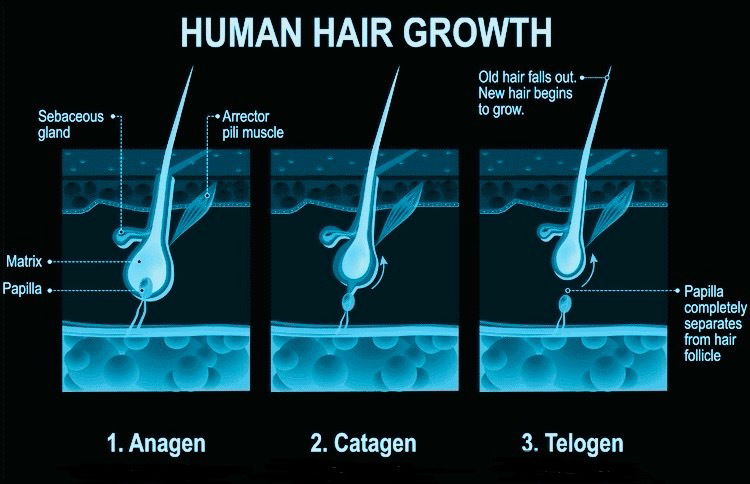Telogen Effluvium

Telogen Effluvium is a non scarring Alopecia presenting as diffuse hair loss.
The hair growth cycle goes through 3 main stages of growth:

In certain altered conditions an abnormally large number of hairs enter the Catagen stage together.
To remain in Anagen growth phase hair needs it’s blood supply to be of good quality and when hair begins to shed excessively is can be a sign of an underlying condition or that something is not quite right internally. Our hair is a mirror of our internal environment.
This condition may be acute and the hair growth cycle may re-set itself relatively quickly, or it may be chronic and continue for long periods of time.
Common symptoms of Telogen Effluvium are excess loss with shampooing and brushing and a loss of ponytail volume. If FMHL is also present temporal and partings may show the scalp more visibly also.
Some of the most common reason for this condition include:
Post-Partum Hair-Loss - After giving birth a large number of hair follicles enter the Telogen phase quickly. Hair is usually then lost 2-3 months later and returns to normal around 6-12 months after giving birth.
Febrile illness/blood loss/post-op - These are all temporary stresses. Hair will be shed 6-16 weeks after the trigger event and will commence spontaneous regrowth as the body returns to normal levels.
Endocrine disorders - Conditions such as Hyperthyroidism and Hypothyroidism for example, can cause diffuse hair loss with usually improves with the introduction of medical interventions such as Thyroxine.
Drugs and medications - Certain prescription drugs can have an effect on making the hair begin to shed. Anti-coagulants used for blood thinning result in a less than good quality blood supply lacking in nutrients and oxygen reaching the follicles. Certain Anti-depressants are known to affect hair growth and Chemotherapy drugs are well know for their effect on rapid hair loss.
Metabolic and Nutritional disorders - Our diet play a huge role in the growth and quality of our hair. Vitamin deficiencies such as Vitamin D, Zinc, Iron, ferritin, B12 for example are very common for affecting hair loss.
Stress is well known to increase hair shedding. High cortisol levels are known to disrupt the hair growth cycle. So trying to take control over our stress levels are highly important when trying to reduce shedding.
Many supplements are now available over the counter for nutritional deficiencies but it’s extremely important to establish what you may be deficient in before popping the pills, and vitamins and minerals from natural food sources are always more desirable than from in a bottle.
Important nutritional factors include protein intake, omega-3 intake, plenty of different coloured fruits and vegetables, and the limiting of ultra processed foods as much as possible. Healthy fats should be incorporated as well as fermented foods to improve gut health.
Smoking and Alcohol all effect the quality of the blood supply that gets to the hair follicles, reducing these where possible, limiting caffeine, and drinking plenty of water to aid scalp hydration are all key.
If you are experiencing hair loss or are concerned in any way a Trichology consultation is recommended to help establish the cause the Telogen Effluvium before Treatments can then be considered/advised. It is so important to understand the exact reasons before commencing any sort of treatment plan in order to be successful with recovery.
The wash test is very useful is you are concerned about your shedding, to complete this test do not wash your hair for 5 days (avoid over brushing too) on the fifth day shampoo your hair and collect all the hair that has fallen (it may be a good idea to cover the drain to help with collection). Bring the hairs collected to a Trichology consultation as part of the analysis.
For all consultations call or msg to book.